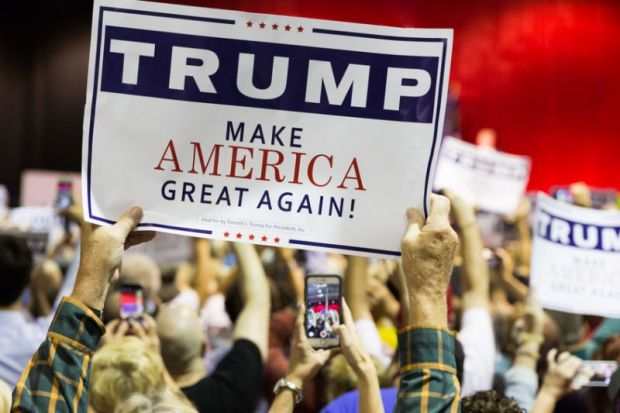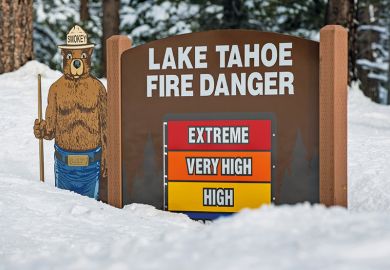Donald Trump has issued his first federal budget plan. It eliminates, among other things, the National Endowment for the Humanities.
Practically speaking, the NEH operates on a minuscule budget of $148 million. This represents 0.003 per cent of federal spending in 2016.
Apparently, our president thinks that this money would be better used to pay for a massive border wall or the build-up of what is already the largest and most powerful military in world history. Trump, it seems, wants the government to get out of the business of funding projects that might lead to compassion for those, such as refugees and immigrants, who are in need.
It should alarm us that Trump prefers spending more money on fighter jets than he does on research that might bring peaceful and humane solutions to global problems.
The NEH was created by the National Foundation on the Arts and the Humanities Act and was signed into law by Lyndon Johnson in 1965. Several things are worth noting about this act.
First, it affirmed that “an advanced civilization must not limit its efforts to science and technology alone” but must also support “great branches of scholarly and cultural activity in order to achieve a better understanding of the past, a better analysis of the present, and a better view of the future”.
Second, it affirmed that “democracy requires wisdom and vision in its citizens” and must provide citizens with education and access to arts and humanities to “make people of all backgrounds and wherever located masters of their technology and not its unthinking servants”.
Third, it affirmed that the arts and humanities reflect Americans’ respect for “the nation’s rich cultural heritage” and foster respect for our country’s vast diversity.
Fourth, it affirmed that “the world leadership which has come to the United States cannot rely solely upon superior power, wealth, and technology, but must be solidly founded upon worldwide respect and admiration for the Nation’s high qualities as a leader in the realm of ideas and of the spirit”.
Perhaps Donald Trump has not read the text of this important act. Or perhaps he has read it and simply does not care.
I have seen two basic but ultimately unconvincing arguments for eliminating the NEH.
The first argument suggests that American society does not need the humanities, rejecting the entire philosophy behind the 1965 act that created the NEH.
Trump wants to eliminate an agency that will help our democracy to thrive. The humanities cultivate the pursuit of truth and evidence-based arguments, empathy for the views of others, civic understanding and an awareness that we are members of a human community that is larger than ourselves or our current moment in time.
The second argument against the NEH is made by libertarian-leaning politicians who appreciate what the humanities bring to US society but do not think that the federal government should be in the business of promoting them.
I would be sympathetic to this argument if I believed that private and corporate interests would step up with the money necessary to support the humanities and the cultural institutions that bring them to life for millions of Americans.
Our shared culture and traditions are constantly evolving and changing to meet the needs of the people who invoke them. The preservation and reinterpretation of these traditions, and the democratic virtues that come with such activity, need support. Do we really want to trust the treasured traditions, stories and markers of our collective or group identities to a capitalist market that is driven predominantly by the pursuit of profit at all cost?
The grand stories of our national identity have a good chance of surviving under such privatisation. We will continue to hear, read and learn about Gettysburg, Paul Revere, women’s suffrage and Martin Luther King Jr.
But what will happen to our ability to tell the local and regional stories that have given meaning to life in small places? Who will fund the work of telling stories of everyday world-changers who have been forgotten because they do not conform easily to our national narratives? Can we rely on those in the private sector to care about the experience a child might have at a small museum or historical site – an experience that could change her life and reorient her way of seeing the world?
In Donald Trump’s America, study and reflection on these kinds of things do not matter. We may be on the brink of a cultural holocaust, and we all have a responsibility to prevent it from happening.
John Fea teaches American history at Messiah College in Mechanicsburg, Pennsylvania. He is the author of five books and blogs daily.
Register to continue
Why register?
- Registration is free and only takes a moment
- Once registered, you can read 3 articles a month
- Sign up for our newsletter
Subscribe
Or subscribe for unlimited access to:
- Unlimited access to news, views, insights & reviews
- Digital editions
- Digital access to THE’s university and college rankings analysis
Already registered or a current subscriber?








